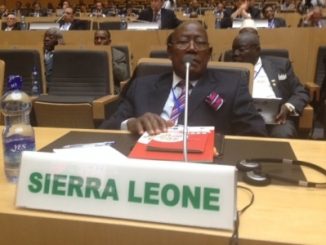
PONDER MY THOUGHTS
BY
Andrew Keili
THE JUDICIARY: AS IT WAS IN THE BEGINNING SO IT IS NOW…
“Election petition verdict: “The law is an ass”. I wrote an article in this column in 2013 with this title, in response to the verdict on the now famous “Ansu Lansana case”. I took this as a personal issue. I know the characters involved, I have seen what that decision has wrought and have experienced what happens to a constituency and the democratic process when the will of the people is subverted by some distant party without consulting them. I am certain therefore I can be excused for verging on the ad hominem as it is only by doing so that the effect can be made vivid to the reader.
I am a relation of all the major parties involved at the local level in constituency 5 in the Kailahun District. The SLPP candidate, Ansu Lansana, and the petitioner Sam May Macarthy are cousins with whom I am intimately acquainted. The lucky APC candidate, Regina Songa Marrah, who was foisted on our constituency is also a close relative. The constituents were stunned and up to this day could not understand the reasoning behind such a decision to overturn their will.
For years I could sense that Ansu found it difficult to get over this injustice, which undoubtedly did not bode well for his health and self-confidence. The imposed candidate, Regina is extremely pleasant, but one could always sense her discomfiture in family gatherings where she would go the extra mile to be overly nice. She did her own bit for her constituents-the usual donation to groups, her attendance at local private and cultural events etc. but one could not help but overhear some of the comments made even by beneficiaries of her goodwill. They would say in Mende “Ye ji, u pieh ma tayekpevalo. Mui gu gor”-translated as “She is only doing it for herself, we do not recognise her”. For years, family members had their beef with the petitioner Sam May Macarthy, who they considered a tool of the APC for depriving the constituency of an exceedingly well qualified MP.
But let me remind my readership about what I wrote in my article at that time:
“The court ruling finally came some fifteen months after the elections. Though concluding that the cases against the defendants had no merit, the learned Judge, Justice Showers ordered that the SLPP candidates’ votes (constituencies 5 and 15) be nullified and the results of the elections read.
Hailing from constituency 05 in Kailahun, I can affirm from repeated calls from constituents that they do not understand the rationale behind a ruling that essentially disenfranchises them and sends to Parliament as a representative someone who belongs to a party they overwhelmingly voted against and who got less than 20 percent of their votes.
The APC has been claiming that the SLPP inflicted this debacle on themselves. “After all the petitioners were ex SLPP MPs”, they claim. This may be true. Their case however rings hollow when you consider the following facts: The petitioner, the former MP for Constituency 5, Sam May Macarthy has since then joined the APC and had brought three bus loads of his constituents to pledge allegiance to the APC and the President. His house is used as the APC Office in Mobai. It also does not help the situation when the MP openly boasts of his links to the President.”
I followed up, “The law is an ass” with another article in September, 2015 on the Sam Sumana judgment titled “Sumana judgment: “The law is (still) an ass”.
We also witnessed a lot of cases involving the internal fighting within the SLPP. In one particular case involving Ambassador Ali Bangura and others, the judiciary took three years to give judgment on the case whilst in the meantime the SLPP was being torn apart at the seams. When the judgment was finally delivered, it became subject to so many interpretations that even the PPRC claimed it needed further clarification.
The actions and inactions of the judiciary continue to cause political turmoil in this country. The unfortunate part is that their judgments on major political issues almost always seem to be mirror the views of the Executive, overtly or covertly. To make matters worse, more often than not these also result in the reshaping of the third arm of government, Parliament. So with one stroke of the pen, they seem to unwittingly make nonsense of the separation of powers!
Better minds have pondered over the recent judgments which many consider bizarre. I will not even attempt to dissect the legal arguments. As in the Ansu Lansana case, the High Court judgments which have resulted in catapulting ten SLPP MPs who came second in the elections into Parliament as MPs and one case involving a re-run seem to defy logic. These have generated so many questions from a skeptical public, quite apart from the criticisms of the opposition APC.
Questions border on several issues-How can the second place candidate be automatically catapulted to be an MP against the will of the people without a bye election? Why were the new MPs automatically sworn into office without waiting for the appeal process to take its course? How do you define the one year period before elections during which the candidate may not be paid from the consolidated fund-up to start of nomination or start of election? Why have the appeals by the APC and NGC not been heard even when they were submitted at the same time? Why were some people asked to refund salaries earned as MPs and others not? What is the yardstick used by the courts for deciding whether the case of an election violence warrants nullification of results? Answers that have been spewed out largely appear to turn logic on its head, whether or not they are based on some legal explanation.
The bottom line is that as in the Ansu Lansana case, the suspicion lingers once again that the judiciary is at the bidding of external parties.
What I wrote then about how Ansu Lansana’s constituents’ rights had been trampled upon is true then under APC as it is true today under SLPP:
“There are a few issues of concern with such a ruling. Parliament is a representative institution, which reflects the dictum – “government of the people, by the people for the people”. The Member, as an elected representative of his constituents, is an agent for the realisation of the aspirations of his people and the nation at large. In this regard, a Member is enjoined to advocate in Parliament concerns of his constituents. Elections enable voters to select leaders and to hold them accountable for their performance in office. Whatever other needs voters may have, participation in an election serves to reinforce their self-esteem and self-respect. This ruling turns this idea on its head for both constituencies.
It is also worth mentioning that one of the causes of our recent civil war was the injustice perpetrated, especially at various levels of our governance system. The TRC report states thus: “The judiciary was subordinated to the executive, parliament did little more than ‘rubber-stamp’, the civil service became a redundant state machine ……..non-state bodies that ought to ensure accountability – like media houses or civil society groups – were thoroughly co-opted…… Lack of courage on the part of lawyers and judges over the years paved the way for the desecration of the constitution, the perpetuation of injustice and the pillaging of the country’s wealth.” Quite an indictment!
I do not intend to dwell on the legal “correctness” of such a ruling. I can only point to the advice given in the conclusion of the TRC report: “Access to justice can also be achieved through a simplification of legal rules so that they may be understood and used by anyone.” Despite the fact that we have a constitution that essentially guarantees representation of the people and we have revamped our electoral laws, to avoid such situations, we have taken a good fifteen months pursuing an electoral case resulting in non-representation of constituents in two constituencies. The situation has been further compounded by the order resulting in these constituencies being represented by people for whom less than 20 percent and 35 percent cast their votes. Furthermore we have several normally vociferous groups on other issues who have kept silent on such an important governance issue. One may ask; Where is the Body of Christ?, Where is the Bar association? Where is civil society? Where is the National Commission for Democracy? Kudos also to SLPP that despite our internecine warfare, we seem to be united on fighting this menace. But should the SLPP be left alone to fight this noble cause?”
Well, the tables have turned. The SLPP is now in power now and owes it to the people of Sierra Leone to address thorny constitutional problems and reform the judiciary. In the party’s submission to Justice Cowan’s CRC, the party made very good comments and recommendations. The SLPP wanted members of the Electoral Commission to be appointed by the President on the recommendation of a “Multi-Partisan Committee and subject to the approval of Parliament”. Not being oblivious of its lack of success in pursuing electoral petition cases swiftly, the party recommended “a transitional period during which all pending legal issues should be resolved before the President is sworn into office”.”.
All lofty ideas-they need to consult their own document again!
The current government owes it to the people of Sierra Leone to speedily review the CRC report and embark upon meaningful constitutional reform and reform of the judiciary. Already the ruling party now has a majority in parliament based on what many consider absurd judicial technicalities. The spate of recent events gives the impression we may heading towards an era in which the judiciary will decide on the composition of Parliament and turn a blind eye to the will of the people in constituencies. For me, I will always consider the two APC MPs thrust upon those constituencies in Kailahun and Kenema and the ten now thrust upon us by SLPP as “Judiciary MPs” for want of a better name.
Right now, with the spate of events, one could still be excused for saying Charles Dickens was probably right in using the phrase, “the law is an ass” referring to the application of the law that is contrary to common sense in his 1838 novel, Oliver Twist.
Our colloquially used Moses’ law-“you do me, ar do you” seems to be very much alive. Indeed, with the judiciary we can probably safely say-“As it was in the beginning, so it is now”. Let us hope we don’t have to complete the doxology by adding “and forever shall be”. Don’t say Amen!




